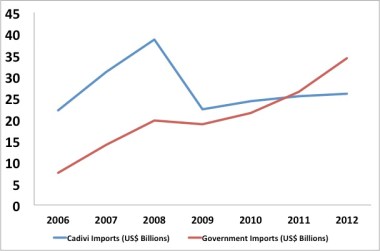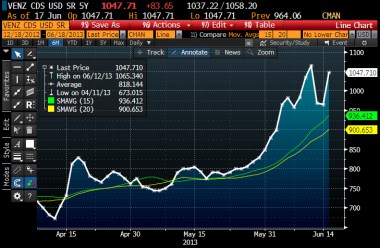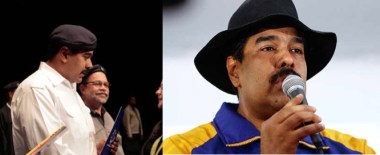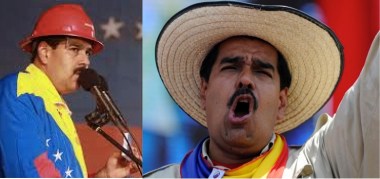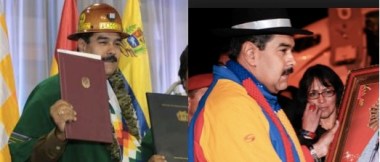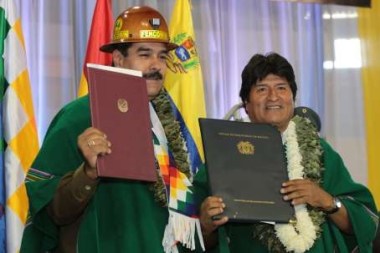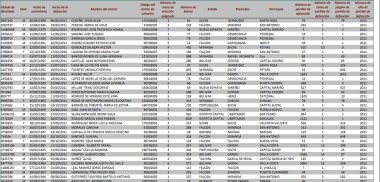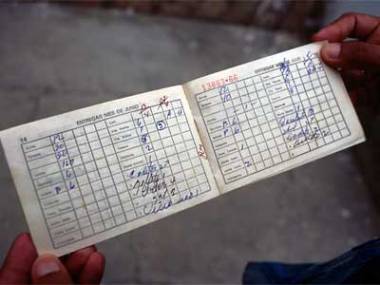
Cuban Rationing Book
You have to wonder what goes through the mind of someone like Zulia Governor Francisco Arias Cardenas. The once coup plotter with Hugo Chavez, who he later ran against, has seen fourteen years of controls fail and he decides that for his State, the best solution is: More controls.
In fact, is not even more controls, it is simply rationing. The idea to give everyone smart cards so that the Government can limit the availability of the twenty food products which have a regulated price, is as stupid, as the regulated price itself.
But these guys push controls relentlessly, despite the fact that not one control has worked in the last fourteen years:
Price controls? Venezuela has had 900% inflation since Chávez came to power fourteen years ago and shortages have been a problem for the last six years. The Central Bank now withholds information on shortages and rumor has it that the CPI jumped over 5% in May.
Exchange Controls? After imposing exchange controls in early 2003, which became even more rigid in 2010, the devaluation of the official rate of exchange has been from Bs. 0.573 when Chávez took power to Bs. 6.3 , “only” a 91% devaluation, give or take a decimal. But, of course, there is a second rate at almost five times the official rate, the true floating rate would be somewhere in between which would represent a 96-97% devaluation, but who is counting anymore? But note, that between 2003 and 2010, the currency devalued from around Bs. 2 to Bs. 8, a factor of four, but the more strict controls since 2013 have increased the black market rate by almost another factor of but in only three years.
Border Controls?: Products going through the borders are checked, creating long lines, so that the National Guard can check to see whether you are exporting product to Colombia which is ten times or so cheaper there. This limits trade, creates long lines, annoys people and…if you slip a few bills into the National Guards pockets, you can certainly get your stuff through anyway. Thus, it becomes another source of corruption, number 3,483 created by the complex system of controls and subsidies in place.
And all of these exquisite controls and interventions have led to less production. Venezuela was an exporter of coffee in 1998, today it imports coffee. In 1999, Venezuela imported very little meat, today it imports 59% of ts consumption. The Government has dramatically expanded its banking sector, but 90-plus percent of agricultural loans come from the private banking sector and the rest from Government owned banks. And so on…
So, this fool who was elected Governor of Zulia decides to create a rationing system to impose more controls on top of the controls.
There are so many things wrong with it, that I am not sure where to start:
-First of all, this costs money. Lots of it. The Governor will now spend money on software, computers, chips, cards, personnel, to impose another control on items which have price controls, because there are shortages. It will make supermarkets spend money in all this, which means the costs for the supermarkets will go up, costs that will be passed to the consumers on the prices of non-regulated items.
-But…you have to create rules. And arbitrage will come in. As soon as the rules are in effect, every single individual entitled to buy, for example, two kilos of sugar per week, will go and buy two kilos of sugar at the supermarket every week. And once there are too many kilos of sugar at his or her home, they will go and sell the sugar at the free market or to street vendors at many times the regulated price. And the same food will show up somewhere at a higher price.And since its scarce, someone will pay for it.
-This is not a very popular measure, so that Mr. Arias better watch his back, as he is doing something that will eventually become very unpopular. If you are going to impose unpopular measures, you might as well impose rational ones.
So, imagine the path that package of sugar has on its way to the true final consumer: First, there are exchange controls, so it will be purchased only after a dozen steps for the approval of the currency to buy sugar. This requires employees for the Government who supervise all the steps, as well as employees for the guy who is importing, who hires people just to satisfy the bureaucracy of CADIVI. Many of these steps, of course, have graft associated with it. Then, the “buyer” will try to get the cheapest quality sugar they can get to maximize profit, since the importer knows that he will have to pay even more on the way to the port. Graft at customs, graft at the dock, cheap products, and finally it gets to the price controlled supermarket, where Governor Arias now will control how much you can buy.
Idiotic is too nice a word to describe all this.
There is no logic for it, no justification for it and you simply create even more economic distortions.
Which one day will have to be unwound.
And these guys don’t look at models anywhere, except one place: Cuba. And despite the gigantic failure of that State, their minds are blocked from looking at Brazil, Chile, Peru, Asian countries, where things are working much better than in Cuba and/or Venezuela.
To me the whole thing is a mystery. At one point Arias Cardenas seemed to be a more pragmatic voice within Chavismo, he now has joined Chavismo in full force, no brains, no thinking, just pure ideology of the worst kind.
